Land Invertebrates
Media

Species Types
Scientific Name
About 30 species in North America north of Mexico
Description
Members of the pygmy grasshopper family are small and have a distinctively elongated pronotum — this plate, which only covers the shoulders of most other grasshoppers, extends back to cover the abdomen in this family. Most live along streams and in other wet habitats.
Media
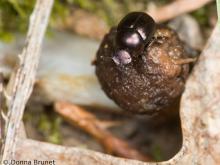
Species Types
Scientific Name
Canthon spp.
Description
Tumblebugs in genus Canthon are usually seen on, near, and beneath poop. They are sometimes seen rolling dung balls away from the original heap, heads down and pushing the ball backward with their hind legs.
Media

Species Types
Scientific Name
About 1,700 species in North America north of Mexico
Description
The scarab beetle family is very large, with breathtaking variety — and often great beauty. Many scarabs are large and colorful.
Media

Species Types
Scientific Name
Euphoria sepulcralis
Description
The dark flower scarab is a scarab beetle that apparently eats pollen, nectar, and perhaps other parts of flowers in late spring, sometimes becoming an agricultural pest. The larvae grow up beneath manure or other decaying materials.
Media
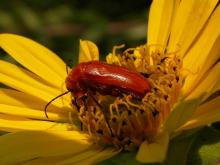
Species Types
Scientific Name
Nemognatha spp.
Description
Nemognatha blister beetles are leathery beetles often seen visiting flowers. There are nearly 30 species in North America.
Media
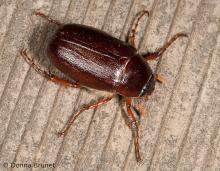
Species Types
Scientific Name
Phyllophaga spp.
Description
May beetles, or June bugs, are common beetles that are named for the months they are most numerous. Clumsy walkers and fliers, they are usually brownish and are attracted to lights at night.
Media

Species Types
Scientific Name
Subfamilies Scarabaeinae and Aphodiinae
Description
Horses, cattle, dogs, and deer all drop manna from above to eager dung beetles, which collect, hoard, and guard the precious organic materials left undigested in the pile.
Media
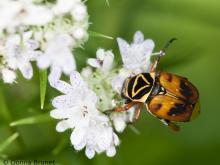
Species Types
Scientific Name
Trigonopeltastes delta
Description
The delta flower scarab got its name from the bright yellow triangle on its pronotum. It commonly visits a variety of flowers in prairies, old fields, and other open areas.
Media
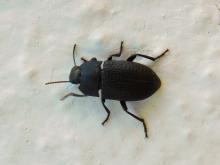
Species Types
Scientific Name
About 1,200 species in North America north of Mexico
Description
Darkling beetles are a very large family of beetles. Most are dull black or brown, crawl on the ground, and are scavengers. Many of them resemble what you might call a “base-model” beetle.
Media

Species Types
Scientific Name
Apis mellifera
Description
The honeybee is a major pollinator of many field crops and tree fruits. Native to the Old World, it is not native to North America. In 1985 it was named the official state insect of Missouri.
See Also


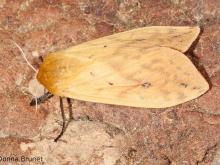
Media

Species Types
Scientific Name
Cisseps fulvicollis
Description
The yellow-collared scape moth is more often “orange-collared.” And whether you think it looks more like a firefly or a wasp, it’s still a moth!
Media

Species Types
Scientific Name
Nearly 150 species in North America north of Mexico
Description
Slim, delicate plume moths are instantly recognizable by their T-shaped silhouette, long legs, and muted shades of tan and brown. It can be hard to separate the various species.
Media

Species Types
Scientific Name
Pyrrharctia isabella
Description
Not many people know the adult Isabella tiger moth when they see one, but we’re all acquainted with its caterpillar, the woolly worm, or woolly bear.
About Land Invertebrates in Missouri
Invertebrates are animals without backbones, including earthworms, slugs, snails, and arthropods. Arthropods—invertebrates with “jointed legs” — are a group of invertebrates that includes crayfish, shrimp, millipedes, centipedes, mites, spiders, and insects. There may be as many as 10 million species of insects alive on earth today, and they probably constitute more than 90 percent all animal species.





















